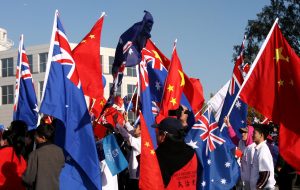A year on from Canberra calling for an independent inquiry into the origins of COVID-19 and Beijing’s subsequent punishing of Australia via economic coercion, Australia has boldened its position by ripping up Australian state agreements with China and threatening to end Chinese ownership of critical infrastructure in Australia.
Australian Foreign Minister Marise Payne announced last month that the Victorian state government’s deals with China, which included a 2018 memorandum of understanding on the Belt and Road Initiative were “inconsistent with Australia’s foreign policy or adverse to our foreign relations” and were therefore terminated.
Chinese officials said the decision was “provocative” and would have serious repercussions.
“This is another unreasonable move taken by the Australian side against China,” a spokesperson said. “It is bound to bring further damage to bilateral relations and will only end up hurting itself.”
China’s National Development Reform Commission then moved to indefinitely suspend the China-Australia Strategic Economic Dialogue, the primary economic forum between the two countries, with the commission accusing Australia of unfairly targeting China.
“Recently, some Australian Commonwealth government officials launched a series of measures to disrupt the normal exchanges and cooperation between China and Australia out of Cold War mindset and ideological discrimination,” the commission said in a statement.
Days later, Australian Prime Minister Scott Morrison rubbed salt in the wound by announcing that his government would not hesitate to review a Chinese company’s ownership of the Darwin port, a critical piece of infrastructure for Australian security.
“If there is advice from the Defense Department or our security agencies that change their view about the national security implications of any piece of critical infrastructure, we have legislation now which is dealing with [that],” he told reporters. “You would expect me as prime minister to take that advice very seriously and act accordingly.
Peter Dutton, one of Australia’s most hawkish figures in the federal government toward China, recently assumed the role of defense minister and is now tasked with providing updated advice to the government’s national security committee on whether to act on the Darwin port contract, increasing the likelihood of some kind of intervention from the government.
Australia’s recent actions come after nearly a year of being on the receiving end of trade attacks from China in the form of tariffs and bans placed on Australian imports, including of coal, wine, barley, lamb, beef, coal, lobster, and timber.
While the trade attacks on Australia have been damaging, the targeted industries have done well in diverting to other activities or increasing exports to other markets. Hit particularly hard, the barley industry shifted to planting other grains or re-routed shipments to the Middle East, while Australians rallied behind the lobster industry, leading to supermarkets being so overwhelmed they had to impose a limit on the number of lobsters customers could buy.
Overall, the Australian economy weathered China’s trade attacks well, thanks mainly to exporting record amounts of iron ore, ironically, to China.
For China, on the other hand, its ban on some Australia products has had an unintended effect. The price of coking coal in China, needed to fuel its steel-making industry, soared to a four-year high after Beijing unofficially banned coal imports from Australia and faced delays in securing imports from neighboring Mongolia. China also faced its worst power blackouts in a decade due to the coal shortage.
China’s actions against Australia may also lead other countries to be more careful in considering investment from Chinese companies.
“They may try to slow the growth of economic ties with China, such as through restricting investment in some sectors,” said Melissa Conley Tyler, a research fellow at the University of Melbourne’s Asia Institute. “This means Chinese investors may find overseas markets less friendly, as has happened in Australia with much of the economy now unavailable.”

































